The Power of Artificial Intelligence: How Chat GPT and Burd are Revolutionizing Communication and Direct Selling
Artificial intelligence (AI) is a field of computer science that focuses on creating machines and systems that can perform tasks that normally require human intelligence, such as perception, reasoning, learning, and decision-making. In this blog, we will explore what AI is, how Chat GPT and Burd are using AI to revolutionize communication and direct selling, the future of AI, and how businesses can leverage AI to drive growth and competitive advantage.
What is Artificial Intelligence?
Artificial intelligence refers to the creation of intelligent machines and systems that can perform tasks that normally require human intelligence. This includes tasks such as visual perception, speech recognition, decision-making, and natural language processing.
How Chat GPT and Burd are Working
Chat GPT and Burd are two examples of AI-powered communication platforms that are transforming the way we communicate and interact with technology. Chat GPT uses advanced natural language processing and machine learning algorithms to simulate human-like conversation and generate responses to user input. Burd, on the other hand, uses AI to power its chatbot and personal shopping assistant, which helps customers find products and make purchases.
The Future of AI
The future of AI is bright, with many experts predicting that AI will play an increasingly important role in our lives and businesses in the coming years. Some of the key trends and developments to watch for include:
1. Increased Automation
AI is already being used to automate a range of tasks, from manufacturing and logistics to customer service and marketing. As AI technology advances, we can expect to see even more automation in various industries, which could lead to increased efficiency, productivity, and cost savings.
2. Enhanced Personalization
AI-powered systems can analyze vast amounts of data to identify patterns and trends, which can be used to deliver personalized experiences to customers. This includes personalized recommendations, offers, and messaging that are tailored to each customer's preferences and behavior.
3. Improved Decision-Making
AI can help businesses make better decisions by providing real-time insights and analysis based on data. This includes everything from predicting customer behavior to identifying trends and patterns in market data.
4. Integration with IoT and other Technologies
AI is increasingly being integrated with other emerging technologies, such as the Internet of Things (IoT) and blockchain. This has the potential to unlock new levels of automation, personalization, and innovation across various industries.
Using AI in Direct Selling
AI has a number of applications in the direct selling industry, including:
1. Personalized Product Recommendations
AI-powered systems can analyze customer data to provide personalized product recommendations that are tailored to each customer's needs and preferences.
2. Predictive Analytics
AI can be used to analyze data on customer behavior, preferences, and buying patterns to make predictions about future behavior and identify opportunities for growth.
3. Customer Service Automation
AI-powered chatbots and virtual assistants can provide 24/7 customer service and support, answering questions and resolving issues in real-time.
The Future of AI in 2025
In 2025, AI is expected to be even more ubiquitous and impactful than it is today. Some of the key trends and developments to watch for include:
1. Advancements in Natural Language Processing
AI-powered systems are expected to become even better at understanding and generating natural language, which could unlock new applications and use cases across various industries
[email protected]
more line
.
2. Increased Automation in Manufacturing and Logistics
AI-powered robots and drones are expected to become increasingly common in manufacturing and logistics, driving higher levels of automation and efficiency.
3. Greater Integration with IoT and Blockchain
AI is expected to become even more integrated with emerging technologies such as IoT and blockchain, unlocking new levels of innovation and disruption across various industries.
4. Advancements in Autonomous Vehicles
AI-powered autonomous vehicles are expected to become more advanced and prevalent in the coming years, revolutionizing transportation and logistics.
5. Continued Growth in AI-Powered Healthcare
AI is already being used to power a range of healthcare applications, from diagnosis and treatment to drug discovery and patient monitoring. This trend is expected to continue and accelerate in the coming years.
Conclusion
AI is a powerful technology that is transforming the way we live and work. From Chat GPT and Burd to direct selling and beyond, AI is being used to drive growth, efficiency, and innovation across various industries. As AI continues to evolve and mature, businesses that embrace this technology will be well-positioned to thrive in the future.

